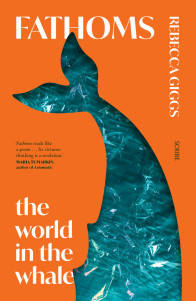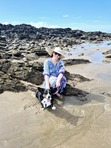Book Review: Fathoms: the world in the whale by Rebecca Giggs
About the Book:

When Rebecca Giggs encountered a humpback whale stranded on her local beach in Australia, she began to wonder how the lives of whales might shed light on the condition of our seas. How do whales experience environmental change? Has our connection to these fabled animals been transformed by technology? What future awaits us, and them? And what does it mean to write about nature in the midst of an ecological crisis?
In Fathoms: the world in the whale, Giggs blends natural history, philosophy, and science to explore these questions with clarity and hope. In lively, inventive prose, she introduces us to whales so rare they have never been named; she tells us of the astonishing variety found in whale sounds, and of whale ‘pop’ songs that sweep across hemispheres. She takes us into the deeps to discover that one whale’s death can spark a great flourishing of creatures. We travel to Japan to board whaling ships, examine the uncanny charisma of these magnificent mammals, and confront the plastic pollution now pervading their underwater environment.
In the spirit of Rachel Carson and John Berger, Fathoms is a work of profound insight and wonder. It marks the arrival of an essential new voice in narrative nonfiction and provides us with a powerful, surprising, and compelling view of some of the most urgent issues of our time.
My Thoughts:
‘For as long as there have been humans, the whale has been a portentous animal. A whale warrants pause – be it for amazement, or for mourning. Its appearance and its disappearance are significant. On the beach, an individual whale’s death may not prove ‘global’ in the way of its body powering down abruptly, like a switch being flicked, but, in a different sense, the deaths of whales today are global. The decline of a sperm whale – filled with sheeting and ropes, plant-pots and hosepipes – belongs to a class of environmental threat that, over the past few decades, has become dispersed across entire ocean systems, taking on transhemispheric proportions. This whale’s body serves as an accounting of the legacies of industry and culture that have not only escaped the limits of our control, but now lie outside the range of our sensory perception, and, perhaps even more worryingly, beyond technical quantification. We struggle to understand the sprawl of our impact, but there it is, within one cavernous stomach: pollution, climate, animal welfare, wildness, commerce, the future, and the past. Inside the whale, the world.’
This is a remarkable book. The scope and sheer detail is so impressive, indeed, there is a reference list for each chapter, such is the depth with which Rebecca Giggs has dug into the history and existence of whales. With writing such a comprehensive account of a species, there’s always a risk that the book will be too much like an academic text, and yet, Fathoms is nothing like that at all. Written as narrative non-fiction, there is a beauty to the prose that is at times almost poetic and certainly always visually stimulating. Interspersed with matter of fact accounts and descriptions, it is at times a tough read, sobering and weighty, and yet, overall, really worth lingering over. I have always loved whales but my knowledge prior to reading this book was pretty slim, I now realise. Fathoms is highly readable and deeply thought provoking – there’s something in this one for everyone.
‘There is hope. A whale is a wonder not because it is the world’s biggest animal, but because it augments our moral capacity. A whale shows us it is possible to care for that which lies outside our immediate sphere of action, but within our sphere of influence – we care deeply, you and I, about the whale because it is distant. Because it speaks to us of places we will not go. Because it magnifies the reach of our humanity, and reminds us of our collective ability to control ourselves, and of our part in a planetary ecology. Because a whale is a reserve of awe and humility.’




Thanks is extended to Scribe for providing me with a copy of Fathoms for review.
[image error]
Read for #2020ReadNonFic hosted by Book’d Out
Category: Nature
About the Author:
Rebecca Giggs is a writer from Perth, Western Australia. Her work has been widely published, including in Best Australian Essays, Best Australian Science Writing, Best Australian Stories, Granta, Aeon, The Atlantic, The New York Times Magazine, and Griffith Review. Rebecca’s nonfiction focuses on how people feel about, and feel for, animals in a time of technological change and ecological crisis.
[image error]
Fathoms
Published by Scribe
Released 28th April 2020



